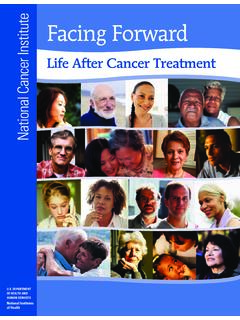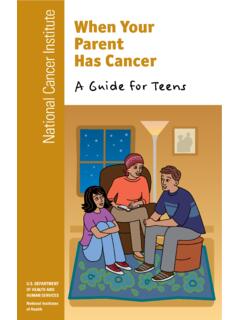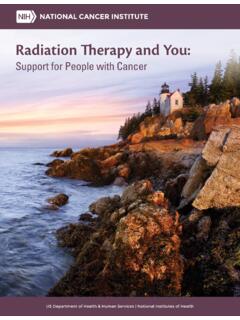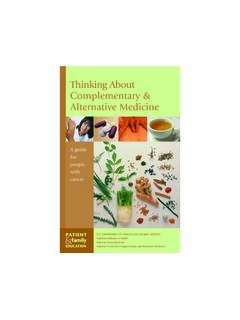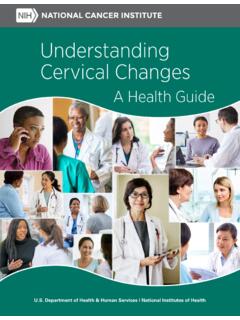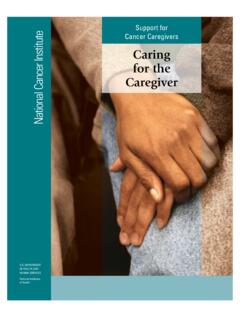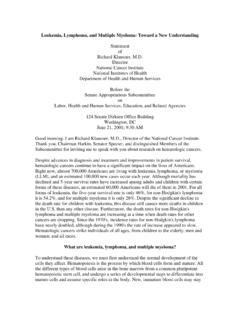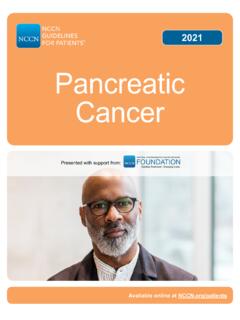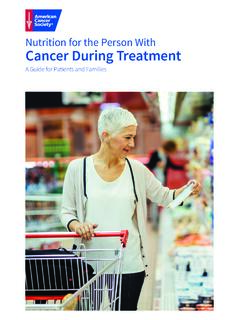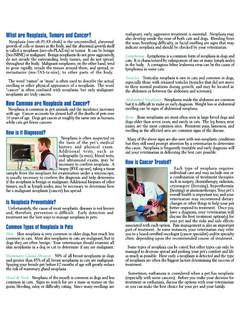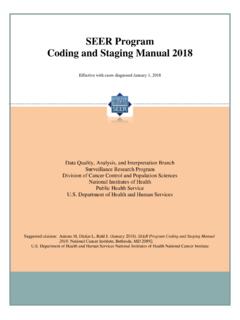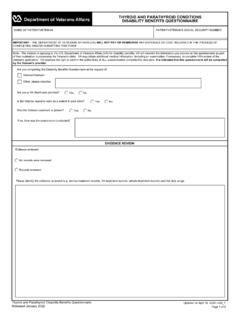Transcription of Support for People with Cancer Eating Hints
1 Support for People with CancerEating Hints : Before, during, and after Cancer Department of Health & Human Services | National Institutes of Health1-800-4- Cancer (1-800-422-6237)The Use of Product or Brand NamesProduct or brand names that appear in this booklet are for example only. The Government does not endorse any specific product or brand. If products or brands are not mentioned, it does not mean or imply that they are not this Book Eating Hints is written for you someone who is about to get, or is now getting, Cancer treatment . Your family, friends, and others close to you may also want to read this book. You can use this book before, during, and after Cancer treatment . It has Hints about common types of Eating problems, along with ways to manage book covers: What you should know about Cancer treatment , Eating well, and Eating problems How feelings can affect appetite Hints to manage Eating problems How to eat well after Cancer treatment ends Foods and drinks to help with certain Eating problems Ways to learn more Talk with your doctor, nurse, or dietitian about any Eating problems that might affect you during Cancer treatment .
2 He or she may suggest that you read certain sections or follow some of the tips. Rather than read this book from beginning to end, look at just those sections you need now. Later, you can always read of ContentsWhat You Should Know about Cancer treatment , Eating Well, and Eating Problems ..1 Feelings Can Affect Your Appetite ..7 List of Eating Problems ..9 Appetite Loss ..10 Constipation ..13 Diarrhea ..15 Dry Mouth ..17 Lactose Intolerance ..19 Nausea ..21 Sore Mouth (Mucositis) ..23 Sore Throat and Trouble Swallowing (Esophagitis) ..26 Taste or Smell Changes ..29Vo m i t i n g ..31 Weight Gain ..33 Weight Loss ..35 After Cancer treatment ..38 Eating Problems that May Be Caused by Certain Cancer Treatments ..391-800-4- Cancer (1-800-422-6237)ivLists of Foods and Drinks ..41 Clear Liquids.
3 41 Full-Liquid Foods ..42 Foods and Drinks that Are Easy on the Stomach ..43 Low-Fiber Foods ..45 High-Fiber Foods ..46 Foods and Drinks that Are Easy to Chew and Swallow ..47 Quick and Easy Snacks ..48 Ways to Add Protein ..49 Way to Add Calories ..52 RecipesBanana Milkshake ..12 Apple/Prune Sauce ..14 Lactose-Free Double Chocolate Pudding ..20 Fruit and Cream ..25 Protein-Fortified Milk ..36 High-Protein Milkshake ..37 Peanut Butter Snack Spread ..37 Table of Contents (continued) You Should Know about Cancer treatment , Eating Well, and Eating Problems People with Cancer Have Different Diet Needs People with Cancer often need to follow diets that are different from what you think of as healthy. For most People , a healthy diet includes: Lots of fruits, vegetables, and whole grain breads and cereals Modest amounts of meat and milk products Small amounts of fat, sugar, alcohol, and saltWhen you have Cancer , though, you need to eat to keep up your strength to deal with the side effects of treatment .
4 When you are healthy, Eating enough food is often not a problem. But when you are dealing with Cancer and treatment , this can be a real challenge. When you have Cancer , you may need extra protein and calories. At times, your diet may need to include extra milk, cheese, and eggs. If you have trouble chewing and swallowing, you may need to add sauces and gravies. Sometimes, you may need to eat low-fiber foods instead of those with high fiber. A dietitian can help you with any diet changes you may need to make. Side Effects from Cancer treatment Can Lead to Eating Problems Cancer treatments are designed to kill Cancer cells. But these treatments can also damage healthy cells. Damage to healthy cells can cause side effects that lead to Eating problems. See the list on page 9 to see the types of Eating problems that Cancer treatment may cause.
5 Common Eating problems during Cancer treatment include: Appetite loss Changes in sense of taste or smell Constipation Diarrhea Dry mouth Lactose intolerance Nausea Sore mouth Sore throat and trouble swallowing Vo m i t i n g Weight gain Weight loss Some People have appetite loss or nausea because they are stressed about Cancer and treatment . But once People know what to expect, they often feel better. 1-800-4- Cancer (1-800-422-6237)2 Getting Ready for Cancer treatment Until treatment starts you will not know what, if any, side effects or Eating problems you may have. If you do have problems, they may be mild. Many side effects can be controlled and many problems go away when Cancer treatment ends. Eat a healthy diet and stay about the same weight before treatment starts. Eating a healthy diet and maintaining weight before treatment helps you stay strong, lower your risk for infection, cope with side effects better, and have a greater chance of receiving treatment without unplanned breaks.
6 Go to the dentist. It is important to have a healthy mouth before you start Cancer treatment . Ask your doctor, nurse, or dietitian about medicine that can help with Eating problems. Discuss your fears and worries with your doctor, nurse, or social worker. He or she can discuss ways to manage and cope with these feelings. Learn about your Cancer and its treatment . Many People feel better when they know what to expect. Ways You Can Get Ready to Eat Well Fill the refrigerator, cupboard, and freezer with healthy foods. Make sure to include items you can eat even when you feel sick. Stock up on foods that need little or no cooking, such as frozen dinners and ready-to-eat cooked foods. Cook foods ahead of time and freeze in meal-sized portions. Ask friends or family to help you shop and cook during treatment .
7 Maybe a friend can set up a schedule of the tasks that need to be done and the People who will do them. Create a grocery list of items you usually buy so that it is easy for friends and family to shop for you. Talk with your doctor, nurse, or dietitian about what to expect. You can find lists of foods and drinks to help with many types of Eating problems on pages 41 to 53. Is DifferentBecause everyone is different, there is no way to know if you will have Eating problems and, if so, how bad they will be. You may have just a few problems or none at all. In part, this depends on the type of Cancer you have, where it is in your body, what kind of treatment you have, how long treatment lasts, and the doses of treatment you receive. During treatment , there are many helpful medicines and other ways to manage Eating problems.
8 Your doctor, nurse, or dietitian can tell you more about the types of Eating problems you might expect and ways to manage them. If you start to have Eating problems, tell your doctor or nurse right away. If you start to have Eating problems, tell your doctor or nurse right away. Talk with Your Doctor, Nurse, or Dietitian Talk with your doctor or nurse if you are not sure what to eat during Cancer treatment . Ask him or her to refer you to a dietitian. A dietitian is the best person to talk with about your diet. He or she can help choose foods and drinks that are best for you during treatment and after. Make a list of questions for your meeting with the dietitian. Ask about your favorite foods and recipes and if you can eat them during Cancer treatment . You might want to find out how other patients manage their Eating problems.
9 You can also bring this book and ask the dietitian to mark sections that are right for you. If you are already on a special diet for diabetes, kidney or heart disease, or other health problem, it is even more important to speak with a doctor and dietitian. Your doctor and dietitian can advise you about how to follow your special diet while coping with Eating problems caused by Cancer treatment . For more information on how to find a dietitian, visit the Academy of Nutrition and Dietetics at 1-800-4- Cancer (1-800-422-6237)4 Ways to Get the Most from Foods and Drinks During treatment , you may have good days and bad days when it comes to food. Here are some ways to manage: Eat plenty of protein and calories when you can. This helps you keep up your strength and helps rebuild tissues harmed by Cancer treatment .
10 Eat when you have the biggest appetite. For many People , this is in the morning. You might want to eat a bigger meal early in the day and drink liquid meal replacements later on. It s okay if you feel like you can t eat a lot of different foods. Eat the foods that sound good until you are able to eat more, even if it s the same thing again and again. You might also drink liquid meal replacements for extra nutrition. Do not worry if you cannot eat at all some days. Spend this time finding other ways to feel better and start Eating when you can. Tell your doctor if you cannot eat for more than 2 days. Drink plenty of liquids. It is even more important to get plenty to drink on days when you cannot eat. Drinking a lot helps your body get the liquid it needs. Most adults should drink 8 to 12 cups of liquid a day.
